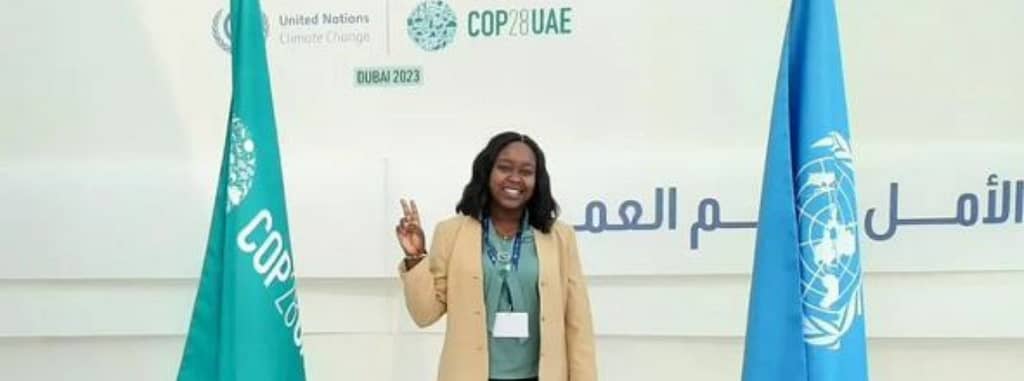The Conference of Parties (COP), aka the United Nations Climate Change Conference, is a critical platform for global climate discussions, they play an important role in uniting parties to address climate change. Investing in the planet’s future means empowering and involving young people like Tolulope Gbenro. Tolulope is one of over 70000 delegates at COP28 and she shared her experience with us.
Tolulope’s journey started long before she knew what climate action meant. She recalls her childhood when, during the rainy season, their compounds would be flooded, and they loved to play in the water, until one day when the rain went past the compound and flooded their house. Years later, during her undergrad days, she started volunteering with Enactus, a community of leaders using business for positive social and environmental impact. on various projects, she realized she was drawn to finding solutions to international development problems.
Now, her work revolves around policy consultation, recommendation, and project implementation. COP 28 was her first experience at a COP. Before the event, she remembers mapping out her goals for attending and can safely say she achieved them, actively contributing by speaking at side events, moderating panels, closely following negotiations, and networking.
Tolulope’s Key Takeaways
Loss and Damage Fund
Tolulope’s first major takeaway was the victory of the Loss and Damage Fund. This fund aims to provide support to vulnerable third-world nations as they deal with the effects of climate change. She was particularly excited about the pledges various countries made currently over $400 billion. However, she stressed the need to ensure that the funds are effectively disbursed to grassroots levels. When asked about the perception that developing nations as constantly beggarly, she explained the need for African countries, especially Nigeria, to invest in themselves—utilizing resources beyond oil and gas and focusing on empowering young people for self-determined development without undue interference from the global north.
Fossil Fuel Phase-Out
Secondly, there have been a lot of intense conversations about phasing out fossil fuels. OPEC has made a statement asking its member states, which includes UAE not to agree to phase out fossil fuels. Tolulope emphasized the importance of realistic conversations and actions, especially in the context of global south countries like Nigeria dependent on fossil fuels for economic growth and a phase-out for all countries could be difficult. She said this back and forth was the hardest part of COP negotiations.
Young people at COP
Tolulope was happy to see numerous young Nigerians at COP, although many were affiliated with schools, international organizations, or civil society organizations rather than directly representing Nigeria. She also noticed more youth representation from other African countries. Kenya’s party negotiators, she said, were a balanced mix of older and younger people. “Intergenerational solidarity is important and I hope to see Nigeria embrace this going forward,” she explained.
She shared a moment of both admiration and reflection when she saw a young African lady moderating a side event with former President Goodluck Jonathan. “We have a culture of respect for the Elders”, she said, “but we should also recognize the technology, and innovation that young people can bring”. On Youth Day, the Nigerian minister for youth mentioned efforts towards this with the launch of a Youth Advisory Council on Climate change, while commendable Tolulope believes accountability is important and that to be successful, this council needs to include relevant young stakeholders.
Climate change and mental Health
We saw health on the negotiation table for the first time and touching on this, Tolulope explained that COP negotiations can come with many emotions from anger or fear, and stressed the importance of protecting our well-being amidst COP.
She also touched on the growth of eco-anxiety globally. She explained that when you speak to 20-year-olds about climate change, you’ll find that many of them think of it as an apocalyptic disaster waiting to happen. They don’t have much hope and often seem reluctant to get involved for this reason.
Overall, Tolulope thinks COP was a win for the Loss and Damage negotiation, but on phasing out fossil fuels is controversial. “It’s important to have realistic conversations and actions” she explained. Looking ahead, Tolulope anticipates increased youth representation from Nigeria, where young and old leaders can sit together and foster intergenerational solidarity to combat the climate change emergency.

